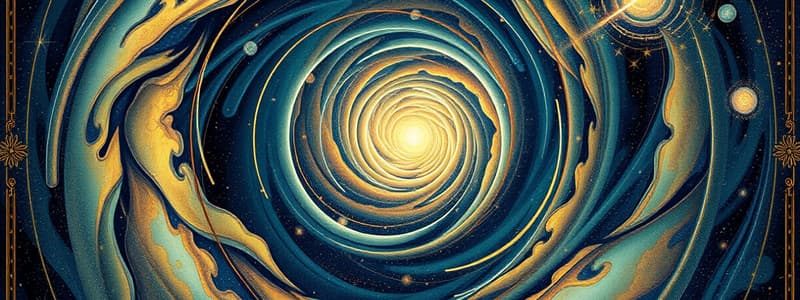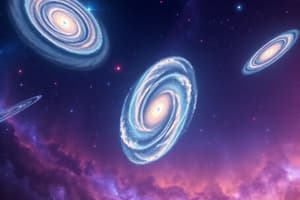Podcast
Questions and Answers
Which of the following is an example of a spiral galaxy?
Which of the following is an example of a spiral galaxy?
- Whirlpool Galaxy (correct)
- Milky Way (correct)
- Andromeda
- Triangulum
What components make up the Milky Way galaxy?
What components make up the Milky Way galaxy?
Bulge, disk, and halo components
The dark regions in the Whirlpool Galaxy are actually silicon and carbon dust.
The dark regions in the Whirlpool Galaxy are actually silicon and carbon dust.
True (A)
What do older red stars live in within a spiral galaxy?
What do older red stars live in within a spiral galaxy?
What primarily characterizes the structure of spiral arms?
What primarily characterizes the structure of spiral arms?
Spiral galaxies have less gas and dust than elliptical galaxies.
Spiral galaxies have less gas and dust than elliptical galaxies.
What classification is given to spiral galaxies with a central bar?
What classification is given to spiral galaxies with a central bar?
Which type of spiral galaxy is characterized by loose, lumpy arms and a smaller bulge?
Which type of spiral galaxy is characterized by loose, lumpy arms and a smaller bulge?
What is the range of classifications for elliptical galaxies based on their shape?
What is the range of classifications for elliptical galaxies based on their shape?
What are irregular galaxies?
What are irregular galaxies?
What causes the Tadpole Galaxy to be distorted?
What causes the Tadpole Galaxy to be distorted?
What do star clusters form from during galaxy collisions?
What do star clusters form from during galaxy collisions?
The odds are high that stars or planets would collide during galaxy mergers.
The odds are high that stars or planets would collide during galaxy mergers.
What may result from the merger of two spiral galaxies?
What may result from the merger of two spiral galaxies?
Flashcards are hidden until you start studying
Study Notes
Spiral Galaxies
- Milky Way: Composed of a bulge, disk, and halo; Earth is positioned about two-thirds out from the center in the disk.
- Whirlpool Galaxy: Features enhanced star formation in its disk due to interactions with a nearby galaxy. The dark regions indicate silicon and carbon dust blocking starlight, while heated hydrogen gas contributes to its red color.
Bulge
- Consists primarily of older red stars residing in the central region of spiral galaxies.
Spiral Arms
- Characterized by the presence of both young blue stars and older stars, contributing to the galaxy's luminosity and structure.
Spiral vs. Elliptical Galaxies
- Spiral galaxies contain more gas, dust, and ongoing star formation compared to elliptical galaxies.
- Spiral galaxies are recognizable by their disks, whereas elliptical galaxies lack this distinct structure.
Galaxy Classifications
- Spiral galaxies can be categorized as S (non-barred) or SB (barred) based on the presence of a central bar.
- Further classification divides these into types "a," "b," or "c," with type "c" having loose, lumpy arms and a smaller bulge than type "a".
SBa Galaxy
- Describes a barred spiral galaxy that features tight, smooth arms and has a relatively large bulge.
Elliptical Galaxies
- Classified from E0 (circular) to E7 (elongated) based on their appearance and shape in the sky.
Irregular Galaxies
- Galaxies that do not fit into the spiral or elliptical categories, known as irregulars, display a more chaotic structure.
Tadpole Galaxy
- Exhibits a distorted shape due to a collision with another small galaxy, leaving behind tidal debris from the gravitational interaction.
Star Clusters
- Formed from gas resulting from galaxy collisions, often showcasing young, massive blue stars due to high star formation rates in such regions.
Galaxy Collisions
- The likelihood of individual stars or planets colliding during galaxy encounters is extremely low due to the vast distances between them.
Mergers
- The merger of two spiral galaxies can lead to the formation of an elliptical galaxy, demonstrating a significant evolutionary process in galaxy formation.
Studying That Suits You
Use AI to generate personalized quizzes and flashcards to suit your learning preferences.




